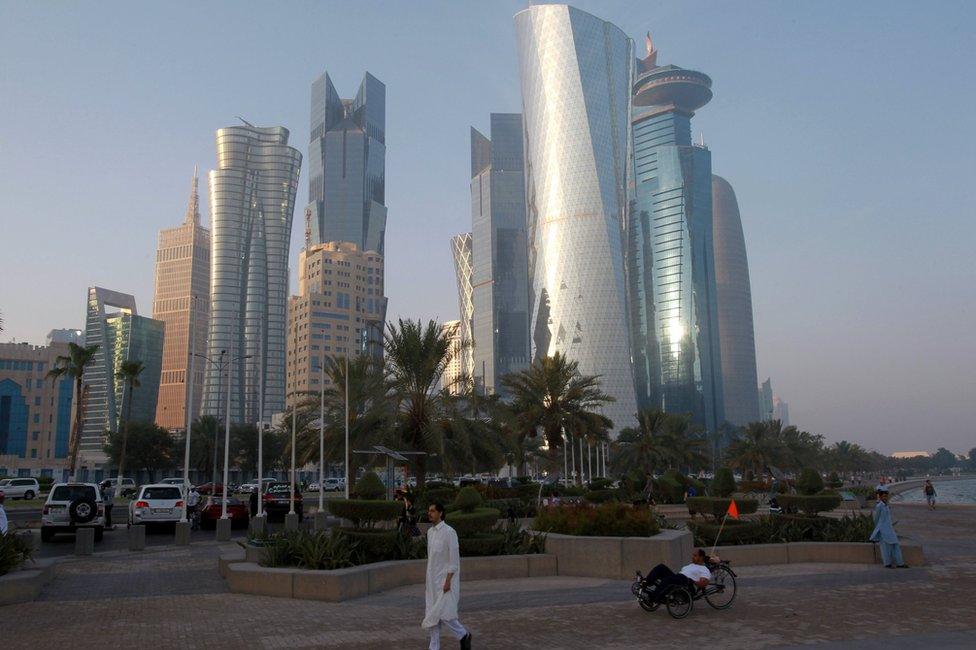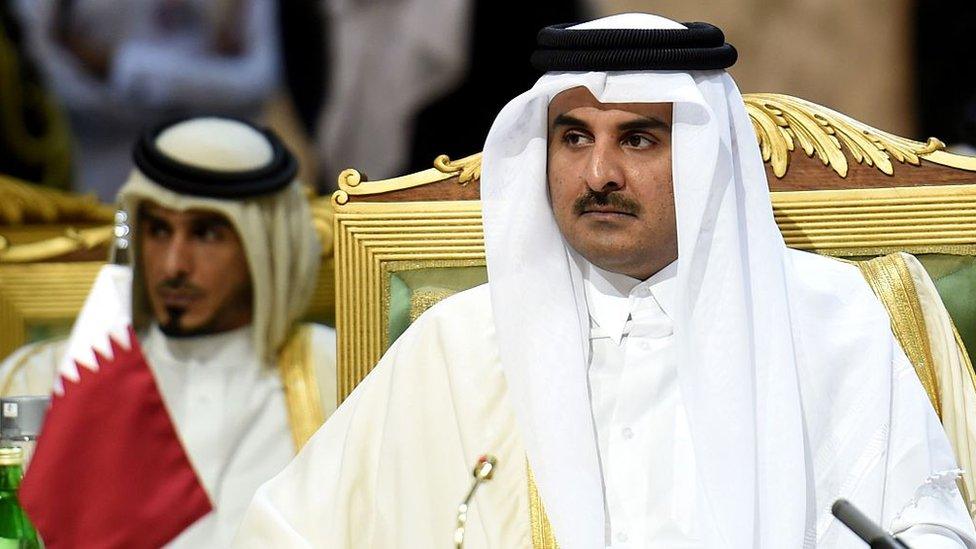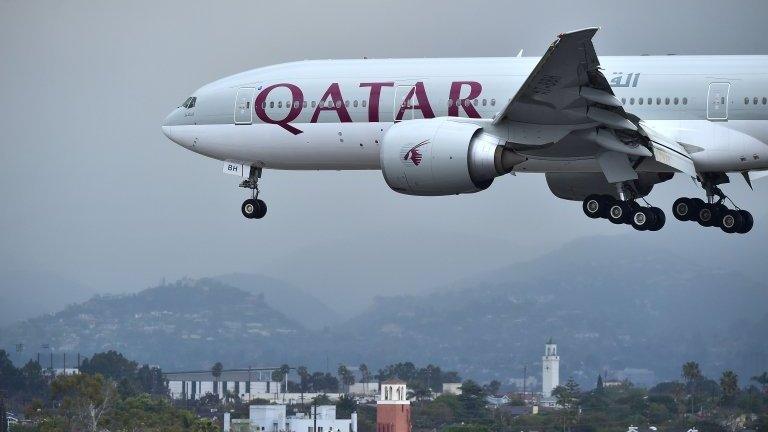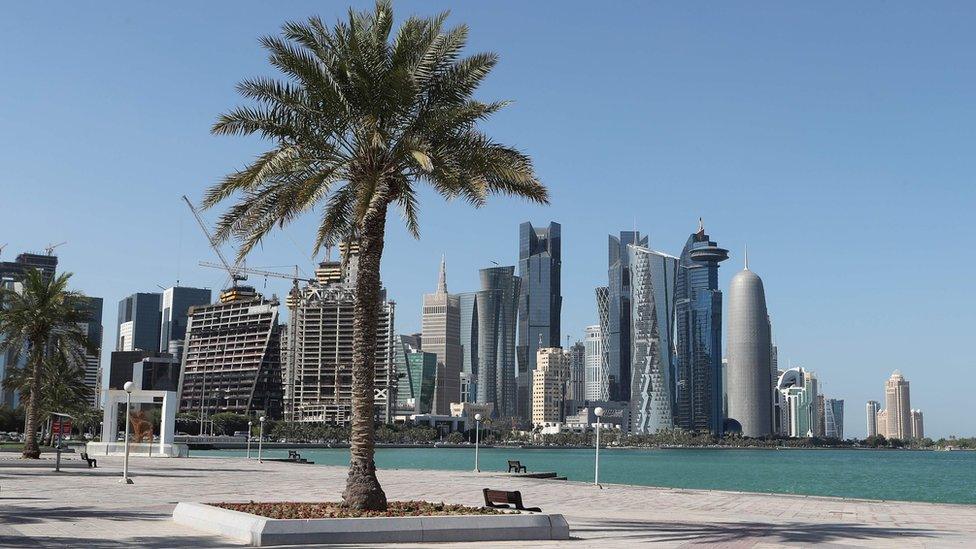Qatar row: Al Jazeera hits back over closure demands
- Published

The crisis is the greatest faced by the Gulf region in decades
Qatari-funded media network Al Jazeera has hit back at Arab states' calls for it to be closed down.
The demands were an attempt to "silence freedom of expression", it said.
Saudi Arabia, Egypt, the United Arab Emirates (UAE) and Bahrain have imposed severe sanctions on Qatar, and sent a list of 13 demands it must meet before sanctions are lifted.
They also want Qatar to reduce ties with Iran and close a Turkish military base - all within 10 days.
It comes after more than two weeks of unprecedented diplomatic and economic sanctions in what is the worst political crisis among Gulf countries in decades.
Qatar, which sought to raise its profile in recent years, denies accusations that it is funding terrorism and fostering instability.
In a statement, Al Jazeera said, "We assert our right to practise our journalism professionally without bowing to pressure from any government or authority."
Giles Trendle of Al Jazeera speaking in June: "We're not partisan to any particular group or ideology"
Qatar crisis deepens as Gulf allies dig in
Why Qatar is the focus of terrorism claims
Five surprising facts about Qatar
Qatari Foreign Minister Sheikh Mohammed bin Abdulrahman al-Thani said earlier that it would not negotiate until the punitive measures were lifted.
He also denied his country supported "any terrorist organisation".
Anwar Gargash, the UAE's state minister for foreign affairs, tweeted: "It would be prudent [for Qatar] to take the demands and concerns of its neighbours seriously. Alternatively, the reality is divorce."
What are the other demands?
According to the Associated Press news agency, which obtained a copy of the list, Qatar must also:
Sever all ties with the Muslim Brotherhood, which is banned in other Arab states
Refuse to naturalise citizens from the four countries and expel those currently on its territory, in what the countries describe as an effort to keep Qatar from meddling in their internal affairs
Hand over all individuals who are wanted by the four countries for terrorism
Stop funding any extremist entities that are designated as terrorist groups by the US
Provide detailed information about opposition figures whom Qatar has funded, ostensibly in Saudi Arabia and the other nations
Align itself politically, economically and otherwise with the Gulf Co-operation Council
Stop funding other news outlets in addition to Al Jazeera, including Arabi21 and Middle East Eye
Pay an unspecified sum in compensation
An unnamed official from one of the four countries told Reuters news agency that Qatar was also being asked to sever links with so-called Islamic State, al-Qaeda and Lebanese Shia militant group Hezbollah.
According to the document seen by AP, Qatar is being asked to shut down diplomatic posts in Iran, expel any members of Iran's elite Revolutionary Guard and only conduct trade with Iran that complies with US sanctions.
The demands have not been officially unveiled. Their publication has increased the friction between the two sides.
Mr Gargash accused Qatar of leaking the details, saying it was "an attempt to abort the mediation in a childish act that we have grown accustomed to from our brother".
Why is Al Jazeera being targeted?
Al Jazeera: "There needs to be an institution that speaks truth to power"
The document specifies that both Al Jazeera and all of its affiliates must be shut down. Al Jazeera, which has an English-language branch, is one of the most widely watched Arabic satellite channels.
Gulf countries and Saudi Arabia's close ally, Egypt, have long accused the broadcaster of providing a platform for Islamist movements and encouraging dissent - claims the broadcaster has denied.
Speaking to the BBC World Service, Jamal al-Shayyal, a senior journalist and spokesman for the award-winning network, said: "The fact that the claims are being levelled by countries who are directly involved either in the creation or funding of [extremist] organisations is beyond ironic.
"Nobody has shown any evidence of any misdoing by our network that would amount to such a ridiculous accusation."
He said staff would be continuing to work as normal to defend press freedoms and "speak truth to power".
Press freedom campaigners have also raised concerns over the proposed shutdown.
"Al Jazeera and press freedom must not be used as a bargaining chip," said free speech organisation Index on Censorship, external.
What if Qatar doesn't meet the demands?
If 10 days pass and Qatar has failed to comply, the list becomes "void", the Reuters source said.
The disruption could have an impact on Qatar if the dispute drags on
It would appear that at least some of the demands are unacceptable to Qatar.
Foreign Minister Sheikh Mohammed said this week his country would not accept any "foreign dictations" and "rejected discussing any matter related to the Al Jazeera channel as it considered it an internal affair".
Who is helping Qatar?
Turkey has been supplying Qatar with food and other goods by air since the sanctions started, and dispatched its first ship carrying food this week, Reuters reports.
Exports from Turkey to the Gulf state have tripled from their normal levels to $32.5m since the sanctions, Turkish Customs and Trade Minister Bulent Tufenkci said on Thursday.
Turkish Economy Minister Nihat Zeybekci was quoted as saying that 105 planeloads of supplies had been sent but airlifting supplies was not sustainable in the long run.
The Turkish military base in Qatar was set up under an agreement signed in 2014.
Two dozen more Turkish soldiers and five armoured cars arrived in Qatar on Thursday, Turkish newspaper Hurriyet reports., external Turkey already has some 90 soldiers deployed at the base.
Turkish Defence Minister Fikri Isik was quoted by Reuters as saying any demand for the base's closure would represent interference in Ankara's relations with Qatar.
Qatar is also supplied by Iran, which sends about 1,100 tonnes of fruit and vegetables each day by sea, Iran's Fars news agency reports.
It has also opened its airspace to flights to and from Qatar, which has been banned from using Saudi and other countries' airspace.
Where is the US in this?
The list of demands was announced after US Secretary of State Rex Tillerson urged Qatar's neighbours to make their demands "reasonable and actionable".
Correspondents say there has been frustration in Washington, which is seeking to resolve the dispute, over the time taken by the Saudis and others to formalise their demands.
US President Donald Trump has taken a hard line towards Qatar, accusing it of being a "high level" sponsor of terrorism.
However, the Arab states involved in the crisis are all close allies of the US.
The largest US base in the Middle East is in Qatar.

Do you live in Qatar? Have you been affected by the sanctions? Let us know by emailing haveyoursay@bbc.co.uk, external
You can also contact us in the following ways:
Tweet: @BBC_HaveYourSay, external
WhatsApp: +447555 173285
Text an SMS or MMS to +44 7624 800 100 (international)
Please read our terms & conditions
- Published22 June 2017
- Published13 June 2017

- Published6 June 2017

- Published5 June 2017
